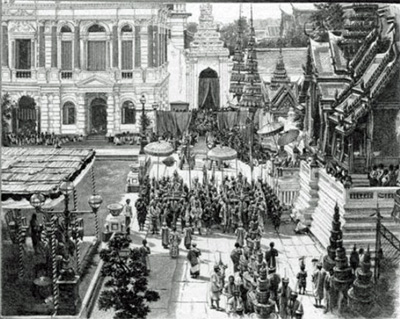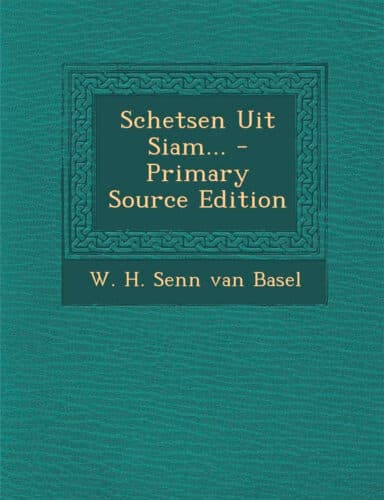During his stay as Dutch consul in Siam, Willem Hendrik Senn van Basel continued to be amazed about the country and especially the people. However, born and raised in the Dutch East Indies, he must have been used to something…
Despite the fact that his booklet Sketches from Siam deviating in many respects from the traditional descriptions that rolled off the presses at the time, he agreed on one thing with other European pen knights who had committed their Siamese experiences to paper: the Siamese didn't give a damn about public hygiene.
Read along and enjoy when he talks about what Chinatown was like at the time: 'After a few minutes of walking we are already there. 'In Lande der Chinese. I have never been,' but I suppose that in the most populous cities of the Celestial Realm there is no conglomeration of more people in a small space, no dirtier surroundings, and no more disgusting stench, than here, in these quarters of Bangkok (...) A market of living and fresh articles is also here, and is distinguished by even greater filth, in which hideous dogs prey on the rubbish, while children catch fish in the fetid gutter that runs on either side of the road, water-carriers, peddlers, and coolies to and fro. walk and Siamese greats passed their time by strolling. Good circulation is not ensured, although at some points there are also native policemen, dressed in worn uniforms. Here a Chinese has temporarily erected a building in the middle of the street to worship his god; a little further on we have to pass under a Chinese theater at the risk that at the same time something unrefreshing will fall from it; horses, ridden by half-naked Siamese, come to hinder still more the already difficult movement, and for the sake of prudence we must always look about, so that we have no time even to devote the necessary attention to the beautiful female heads, which also make this place charming. Fruits of Chinese and Siamese mixture are these beauties.'
Even the royal palace did not escape this trend: "Entering we are again struck by some sharp contrasts. Filth and opulence are united here. Next to the most beautiful bronze statues, hidden under the proliferating tropical plants, next to dragons with their heads cut off, Chinese mandarins of granite whose limbs have been mutilated, in the forecourt of the King's Wat, laid with brass floor tiles, stand two splendid marble statues, by Louis XIV donated. The Hindu style predominates in the palace, but European art is not excluded either. The facade is even an imitation of that of the Tuileries. And next to the rich rooms, furnished with blue and silk damask furnishings, are the rooms in which the hundreds of women reside, even the doorsteps of which are covered with a most disgusting layer of air-corrupting dirt.'
While he made no secret of his sympathy for the ordinary Siamese, when he put it in his Sketches from Siam over the rich and powerful in the kingdom. Although I did not find conclusive evidence in the National Archives in The Hague, I have such a dark brown suspicion that one or more of these Siamese powerful people somehow had a hand in the forced resignation of Willem Hendrik Senn van Basel as consul and that he Sketches from Siam used to gain his weight. When describing a garden party on the spacious domain of the Minister of Foreign Affairs, for example, he could not help but include a disconcerting portrait of the, in his eyes, empty-headed Siamese Beautiful world to paint: ' The Siamese, especially those who have been in Europe for a shorter or longer period of time and who therefore understand some English and have mastered something of European manners, take this opportunity to exhibit what they have learned. It consists in playing billiards, in drinking and swearing, in telling very daring anecdotes and in putting on nice clothes. That is the only result of their precious education.'
As if this were not enough, Willem Hendrik felt that the leading circles in the country mainly consisted of slackers: 'The tall or wealthy Siamese turns night into day and vice versa, usually does not get out of bed before ten o'clock in the morning, has breakfast with his first wife and receives the few persons who urgently need to see him, and then goes - it's then gradually become one o'clock — to rest again, so as not to reappear till five, six o'clock. At that time the day really begins for these Siamese, they begin to work, to make visits, to start or break off negotiations, and as a rule they do not return home or to a domestic circle until one o'clock in the evening, where then, apart from all business, with song and dance, with comedies or recitals, performed by their young wives or female servants, they pass the time until three or four o'clock in the morning, as when they go to rest again .'
Not to mention the wastefulness of the rich and powerful: 'What even the most casual visitor to Siam cannot fail to notice is the prodigious manner in which the Siamese greats or rich spend their income. This is evidenced by the multitude of steamboats to be found along the banks of the river or in the numberless creeks and canals that divide Bangkok into so many islands. Abandoned or only guarded by a few pawns, who themselves rob the vessel of everything of value to satisfy their lust for dice or adultery; The Buddha temples, which are constantly being built, testify to this, while the restoration of already existing temples would amply suffice; to this also testify the magnificent palaces furnished with opulence, which likewise have not ever been beaten with the aim of dispelling the harmful influence of time and use; Finally, the countless products of European arts and crafts, which have been bought at unheard-of prices, testify to this, only to soon be neglected and forgotten.'

For a – former – diplomat, Willem Hendrik Senn van Basel was unusually sharp in his final assessment of the greats in the country who, in his eyes, have corrupted the people: ' The sad scenes which we described and witnessed are as dishonorable to the rulers of Siam as they injustice to the nature of the people and spirit of religion, which compares so favorably with those of other Asiatic peoples because of forbearance and preaches gentleness, fights against rough violence. But the greed for luxury and conceit of the princes and greats, who want to put themselves on a par with the great of the European nations, have made them work the moral downfall of the people, in order to satisfy their ever-increasing thirst for money. They have made opium abuse and drunkenness the common attributes of the Siamese; they have populated the dice-houses and cock-fights: they have let the inhabitants be sucked out by the tenants, that the rents might be increased disproportionately for their benefit; in pawnshopship they have enabled the people to find a means to indulge their drinking and dice rage; they have turned robbery and murder into a profitable business of the greats for which the prisons provide the necessary staff…”
In the meantime, one hundred and forty years later, I wonder whether the politicians in The Hague have been set up with Willem Hendriks' outpourings, precisely at a time when, after the debacle of the VOC, relations with Siam started to normalize again...



A man with a sharp face - and a sharp pen, this Willem Hendrik! Thanks for this interesting contribution, Lung Jan.
Nice story; thanks for that !
Wonderful information about exciting times, Lung Jan, especially when you consider that
the writer and the class described will have thought that they were the leading persons
were in the world at that time, that they were the modern people.
Will it turn out in 140 years that we are as decadent and snobbish as the Siamese were then?
And I also thought that the people of that time must have possessed an unimaginable degree of immunity, given the hygienic conditions.
We can only envy that.